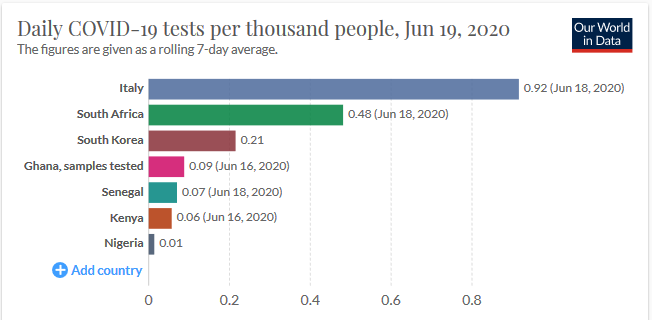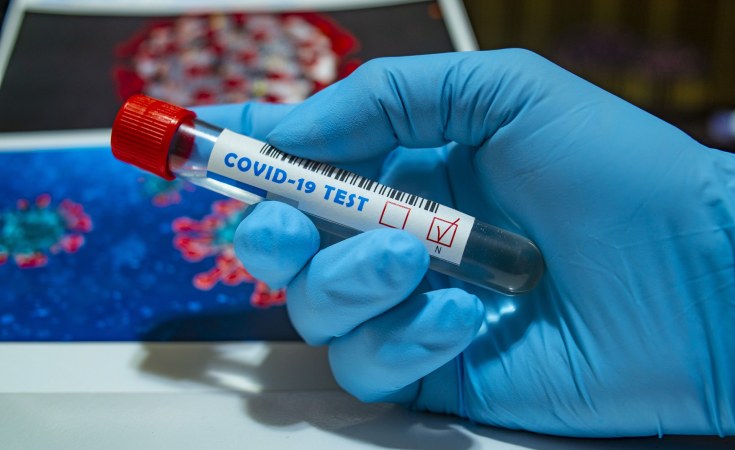Nigerians who keep track of the number of Coronavirus tests in other countries have always argued that the number of infections in Nigeria has to be higher than official figures from the Nigerian Centre for Diseases Control (NCDC) which are based on inadequate testing. They may now have proof for their doubts. The Kaduna State Government decided to go into communities in the state that have not reported cases of the new coronavirus to conduct tests using mobile laboratories.
This random testing reveals a 16% coronavirus infection rate in Kaduna. This is quite scary considering that the tests were carried out in communities that had not reported any cases rather than in communities that are experiencing a “surge” of the infection. Compare the 16% infection rate in the Kaduna communities with the 7.15% in Dakota County, one of the infection “worst hotspots” in the United States of America. The rate of infection in Dakota County, at 7,147 per 100,000, was (at 13 May, 2020) the second-highest per-capita rate in the US.
Kaduna State is the eighth-most affected in the country with 490 cases according to the NCDC. Governor El Rufai has threatened to impose another lockdown if the rates of infection continue to rise in order to prevent the healthcare system from being overwhelmed. Kaduna State has been very proactive in taking steps to curtail the spread of the coronavirus.
Also Read:
- Regular Consumption of Vitamin D Boosts Immunity Against COVID-19
- Covid-19 & Stigma: Nigerians Giving NCDC Wrong Names and Addresses During Tests
- COVID-19: US, South Africa, Peru, Others Take The Lead in Excess Death Rate
- Dozens of people in China infected with new virus called Langya transmitted from animals
The state imposed a partial lockdown on March 24 2020 even before the state recorded its first case. It proceeded to shut its borders to non-essential movements and restrict inter-state travel. However, these efforts were frustrated by a lack of strict adherence to the rules. People were caught trying to smuggle themselves into the state by hiding amidst livestock. Governor El Rufai took to Twitter on 14th of June to condemn the complicity of the security agencies in aiding unauthorized entry into the state.
The number of infected Nigerians which currently stands at 17,735 is 17% of the 106,006 samples tested. This is uncannily similar to the 16% infection rate found in Kaduna communities through random testing. The number of infected people reported is respectively 0.04 %, 0.06%, 0.03 %, 0.01% and 0.01% of the populations of Lagos, FCT, Kano, Rivers and Oyo, Nigeria’s five states with the highest number of infections. Increasing the number of tests conducted would definitely increase the rate of infection. If the 16% rate of infection revealed through random testing in Kaduna is applied to the five states with the highest number of infections, their infection rates will increase by the following numbers:
Coronavirus infection rates in Nigeria’s five most affected states
| State | Population | NCDC declared cases | NCDC cases as percentage of population | Infection rate applying 16% from Kaduna random testing |
| Lagos | 17,500,000 | 7,616 | 0.04% | 2,800,000 |
| Abuja | 2,440,000 | 1,391 | 0.06% | 390,400 |
| Kano | 3,931,300 | 1,160 | 0.03% | 629,008 |
| Rivers | 5,198,716 | 696 | 0.01% | 831,795 |
| Oyo | 5,580,894 | 661 | 0.01% | 892,943 |
The 16% rate of infection cannot be applied to the whole of Nigeria; there are many rural areas that we may still safely assume have remained without any infections. The actual rate of infection in even the five most impacted states is likely to be lower given that there are large rural populations in states like Oyo and Ogun states. (These states also have international borders through which known cases have come into the country). However, Nigeria may be heading towards the 16% rate if measures are not taken to better enforce restrictions on intercity movement as well as put in pace measures to ensure the smooth flow of food from rural to urban areas as we recommended in Covidnomics: Five Ideas to Enhance Nigeria’s Food Security.

Where are the infected?
There are indications that Lagos is running out of beds at isolation centers, even with the NCDC-reported 7616 cases for the state. The question arises – where are the infected if we assume that the real infection rate is significantly higher than what has been discovered through testing. There is a possibility that some of the people who have been infected but have not been diagnosed are living with and surviving mild symptoms of the coronavirus. It is becoming common to come across Nigerians complaining of “a new strain of malaria” with symptoms eerily close to those of the new coronavirus on the internet.
Writer and cultural critic, Ozzy Etomi, revealed via Twitter that she had contracted and survived the new coronavirus. She disclosed that she suffered from symptoms such as fever, bodily aches, headaches, stomach cramps, loss of smell and fatigue but got well before she could go for a test. She later took an antibody test which confirmed that she had indeed been infected. Antibody tests reveal the presence of proteins in the body which provide immunity against a new coronavirus infection in the bodies of those who have survived an infection.
Oluwaseun Ayodeji Osowobi, an activist who runs the Stand to End Rape Initiative, spoke to Al Jazeera about a similar experience. She reported having high fever, cough, loss of sense of taste, heightened sense of smell, appetite loss and nausea. Another Nigerian, John Opabola, revealed on Channel’s Television Sunrise Daily that his suspected coronavirus symptom started with a dry cough and quickly developed into high temperature, aches, fatigue, diarrhea, and vomiting.
Governor Nasir El Rufai has clearly articulated what is at stake – Nigeria’s decrepit healthcare system cannot cope with an explosion in the rate of coronavirus infections. The economy also cannot cope with another round of lockdowns to curtail the spread of the virus. Governments at the Federal and State levels should follow the example of Kaduna State and roll out an aggressive random testing exercise. Antibody tests should be expanded to better understand the rate and patterns of infection.
Part of the solution is to find ways to enable those who are willing and able to pay for any of these tests to quickly do so. We have to learn to successfully live with the pandemic. This requires imagining the worst-case scenario, like Ecuador where the healthcare system has been overrun and bodies of people who have died from Covid-19 litter the streets, and assiduously plan against it. The country currently has 48,490 cases and 4,007 deaths.
























